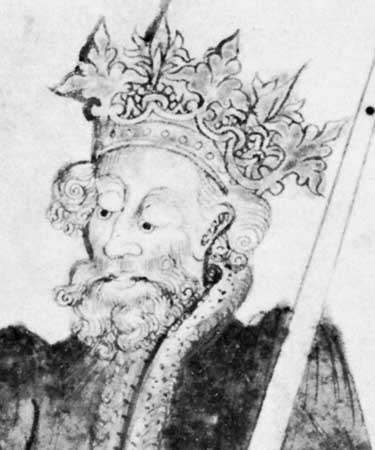Edward II
king of England
byname Edward Of Caernarvon
born April 25, 1284, Caernarvon, Caernarvonshire, Wales
died September 1327, Berkeley, Gloucestershire, Eng.
 king of England from 1307 to 1327. Although he was a man of limited capability, he waged a long, hopeless campaign to assert his authority over powerful barons.
king of England from 1307 to 1327. Although he was a man of limited capability, he waged a long, hopeless campaign to assert his authority over powerful barons.The fourth son of King Edward I, he ascended the throne upon his father's death (July 7, 1307) and immediately gave the highest offices to Edward I's most prominent opponents. He earned the hatred of the barons by granting the earldom of Cornwall to his frivolous favourite (and possible lover), Piers Gaveston (Gaveston, Piers, Earl of Cornwall). In 1311 a 21-member baronial committee drafted a document—known as the Ordinances—demanding the banishment of Gaveston and the restriction of the King's powers over finances and appointments. Edward pretended to give in to these demands; he sent Gaveston out of the country but soon allowed him to return. In retaliation the barons seized Gaveston and executed him (June 1312).
Edward had to wait 11 years to annul the Ordinances and avenge Gaveston. Meanwhile, the Scottish king Robert I the Bruce was threatening to throw off English overlordship. Edward led an army into Scotland in 1314 but was decisively defeated by Bruce at Bannockburn on June 24. With one stroke, Scotland's independence was virtually secured, and Edward was put at the mercy of a group of barons headed by his cousin Thomas of Lancaster (Lancaster, Thomas, 2nd Earl of, Earl Of Leicester, Earl Of Derby), who by 1315 had made himself the real master of England. Nevertheless, Lancaster proved to be incompetent; by 1318 a group of moderate barons led by Aymer de Valence, earl of Pembroke, had assumed the role of arbitrators between Lancaster and Edward. At this juncture Edward found two new favourites—Hugh le Despenser and his son and namesake. When the King supported the younger Despenser's territorial ambitions in Wales, Lancaster banished both Despensers. Edward then took up arms in their behalf. His opponents fell out among themselves, and he defeated and captured Lancaster at Boroughbridge, Yorkshire, in March 1322. Soon afterward, he had Lancaster executed.
At last free of baronial control, Edward revoked the Ordinances. His reliance on the Despensers, however, soon aroused the resentment of his queen, Isabella (Isabella Of France). While on a diplomatic mission to Paris in 1325, she became the mistress of Roger Mortimer, an exiled baronial opponent of Edward. In September 1326 the couple invaded England, executed the Despensers, and deposed Edward in favour of his son, who was crowned (January 1327) King Edward III. Edward II was imprisoned and in September 1327 died, probably by violence. His career is recounted in Hilda Johnstone's Edward of Carnarvon (1946).
- D.J. Enright
- Djibouti
- Djibouti, flag of
- Djibouti, history of
- Djibril Tamsir Niane
- Djilas, Milovan
- Djoser
- Djuna Barnes
- Djursland
- D-lines
- DLL
- Dmanisi
- Dmitrii Gulia
- Dmitry Alekseyevich, Count Milyutin
- Dmitry Alekseyevich Milyutin, Count
- Dmitry Andreyevich, Graf Tolstoy
- Dmitry Andreyevich Tolstoy, Graf
- Dmitry, False
- Dmitry Fedorovich Ustinov
- Dmitry (II) Donskoy
- Dmitry Iosifovich Ivanovsky
- Dmitry Ivanovich Mendeleyev
- Dmitry Kabalevsky
- Dmitry Kantemir
- Dmitry Medvedev